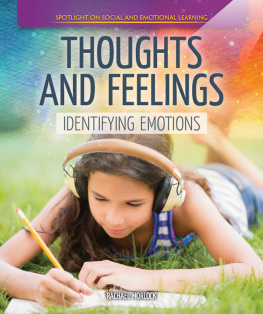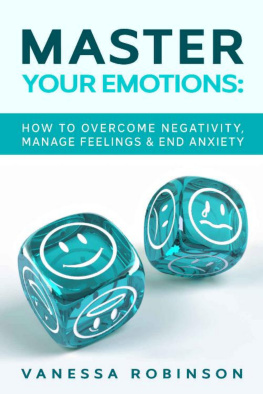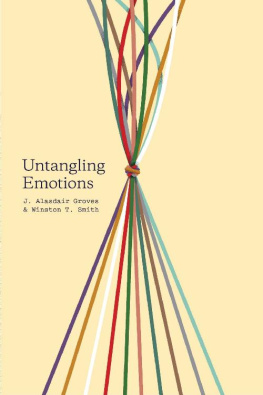Alexithymia, A World Without Emotions
Juan Moises de la Serna
Translated by Kenia Vanegas
Alexithymia, A World Without Emotions
Written By Juan Moises de la Serna
Copyright 2017 Juan Moises de la Serna
All rights reserved
Distributed by Babelcube, Inc.
www.babelcube.com
Translated by Kenia Vanegas
Babelcube Books and Babelcube are trademarks of Babelcube Inc.
Preface
A lexithymia is a problem that is more common than is often thought of, and it affects people making interacting with others difficult.
For some years now, an effort is being made by psychologists to spread the importance of emotional intelligence and how to use it for self and others benefit.
This book joins the effort to spread the word. What are emotions? How do they affect our decisions? And above all, how can we take advantage of them in our daily lives?
Discover all the keys about alexithymia and how to prevent it, and if you suffer from it, learn how to find the solution, to thereby, improve your coexistence with others.
You are emotionless,
That has confused you,
But, not to worry,
Because you were born this way,
You interact with others,
You are misunderstood,
You have had to learn,
And now you have succeeded.
LOVE
Contents
Dedicated to my parents
Acknowledgments
I would like to take the opportunity to thank all the people who collaborated in completing this text, especially, the government of Canary Islands, Dr. Pedro Luis Nieto (secretary of the Department of Psychology and Pedagogy at CEU San Pablo University), Dr. Jaci Molins Roca (director of university graduate and organizational coaching staff at Rovira i Vigili University), Mrs. Virginia Iglesia (specialist in emotional dependence, high sensitivity, and toxic family), and Mrs. Laura Snchez (teacher, coach, and consultant of online businesses).
If you would like to contact the translator of this book, Kenia Vanegas, for translation purposes, you may do so at (translationsbykenia@gmail.com).
Chapter 1. Emotions
E motions are a part of life, although sometimes we may not be aware of it, they are present in each of the actions and decisions that we make, hence the importance of studying them. From the time of getting up, emotions are activated to mark how we feel and how we see everything that surrounds us, a bad dream, an incessant pain while trying to sleep, or a concern that has not let us "shut eye" the whole night is enough for us to get up in bad mood. With this attitude, its difficult to have a good day, since everything seems to make us feel bad. The comments of others or a simple look can make us "jump" or show our worst face of annoyance or dislike. On the other hand, when we have just gotten up from a peaceful night, in a dream place, while enjoying the holidays with the person we love, everything becomes "a bed of roses," it seems as if the world stops and is gentler.
Any inconvenience that arises is attributed to something transient and unimportant, returning smiles and good words "left and right," no matter whether the other person has done something or not, but emotions are not only what is felt and is expressed from the inside out, they are also what is perceived by others. In an eminently social world, everyone is able to identify a disapproving face, a mischievous look, or a sincere smile.
There are many cues that help us comprehend and understand what happens around us, one of the main components: verbal and nonverbal language. Regarding the former, it helps us understand others, not only the content of what is said (e.g., I love you!, I do not want to see you!, etc.) but also the volume (e.g., whispering, screaming, etc.) and the tone in which its said (e.g., honestly, sarcastically, etc.).
Regarding nonverbal language, its expressed by the distance that we maintain with the other person (e.g., near, far, etc.), body posture (e.g., leaning forward, backward, etc.), or gestures with the hands (e.g., closed fist of threat, outstretched offering hand, etc.) or the face (e.g., raising or lowering of the eyebrows, frowning, opening or closing the mouth a lot, etc.). The face is the best presentational card. The face and its gestures have become important elements serving both to express emotions and to identifying them in others, such is the fact that babies pay more attention to faces than any other stimuli, so it can be said that we are predisposed to analyze faces.
The face has more than thirty muscles controlled by cranial nerves such as the facial, oculomotor, trochlear, or trigeminal, from which the brain receives proprioceptive information that serves to identify its own emotions while it activates the muscles to express them. Although some patterns about the expression of emotions have been identified, it seems that theres a high social learning component in them, since according to transcultural studies, depending on which region of the world the same emotion is found, it may be expressed one way or another, despite what is recognizable about almost all these features:
- Closing of the eyebrows, curving and raising them, stretched skin under the eyes, horizontal wrinkles on the forehead, opened eyelids and jaw, before a surprise.
- Close contracted eyebrows, wrinkles in the middle of the forehead, opened upper eyelid, opened or tight mouth, for fear.
- Raised upper lip, raised cheeks, lowered eyebrows, wrinkled nose, for disgust.
- Lowered eyebrows and contracted upon themselves, tensed inner eyelid, tightened lips, vertical lines on the eyebrows, for anger.
- Lip corners up and towards the back, raised cheeks, wrinkles under the lower eyelid, "crow's feet" wrinkle, nasolabial fold, for happiness.
- Eyes upwards, lip corners downwardly inclined, raised upper eyelid angle, for sadness.
Based on the fact that members of a same society share clear identifying features in their expression of emotions through the face, a series of techniques that automate this process have been developed, being able to detect any emotion simply by an image of the face of the person. These techniques are called techniques for automatic recognition of emotions.
An ability, the one to identify emotions on the faces of others, is shaped at an early stage due to the development of being able to imitate others, in babies. Ability that far from being stable over time, decreases with age, at least that's how a research published in the journal Psychological Science by the Human Development Institute Max Planck of Germany [1] has demonstrated. The study indicates validation of previous results, it observed that men have more difficulty than women in recognizing emotions in the "other," a longer exposure of the emotional face to be identified is needed before being able to give a correct answer.
Previous results showed that older people have more difficulty than younger people in analyzing the emotions of others. The study made to 100 couples in two age groups between the ages of 20 and 30 years old (younger group) and between the ages of 70 and 80 years old (older group) observed how they behaved and if they were able to identify the emotions of their partners, achieving similar results in both groups.
This apparent improvement in the group of older people who normally have worse results is explained by their previous experience accumulated, obtained by the cohabitation of partners that make use of other cues to know what the other is feeling, beyond the expression that exists on their faces.
In the search of identifying characteristics of emotions, speech pattern search techniques have been developed, where it has been demonstrated how "distortions" happen in verbal production when we are subject to certain emotions like stress, thus, being able to complement the results of the facial expression study. Such is the importance of nonverbal expression, especially communication through the face of emotions, that when something prevents proper expression, others perceive it as a cold and distant person, this is the case for those who have suffered total or partial paralysis of the face muscles, for example, as result of a stroke or cerebrovascular accident. But, what happens when you voluntarily paralyze your face muscles to look younger like with the use of Botox?
Next page











